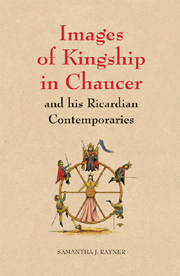2 - Langland: Piers Plowman
Published online by Cambridge University Press: 12 September 2012
Summary
Although very little is known about William Langland, the fifty-two manuscripts that survive of Piers Plowman suggest that it was one of the most widely read poems of its time. These manuscripts represent at least three, and arguably four, separate versions of the poem, each with its own identity, which have been respectively designated as the A, B, C and Z texts. The B text will be the one used here, as it is the most complete: it is also the base text of A. V. C. Schmidt's accessible edition of the poem. The B text has been dated to between 1377 and 1379, which makes it perhaps the earliest of the works under discussion here, although the C text has been dated to the late 1380s, making it evident that Langland continued to revise his poem in the light of maturing years and changing experience.
Langland was probably a cleric, born in the Malvern area of Worcestershire circa 1330; he married and went to London, where he lived until returning to Malvern in later life. He may have died about 1387, based on evidence gained from the poem's contemporary references. The care with which the different manuscripts are copied suggests that they were reproduced in London. They also show a high regard for the integrity of Langland's text, a rare occurrence in the transmission of medieval works from this period, which in turn implies that the poet occupied a more mainstream place in Ricardian poetry than has previously been claimed, a place that justifies his status as a poet whose work has never disappeared from the literary scene.
- Type
- Chapter
- Information
- Publisher: Boydell & BrewerPrint publication year: 2008



